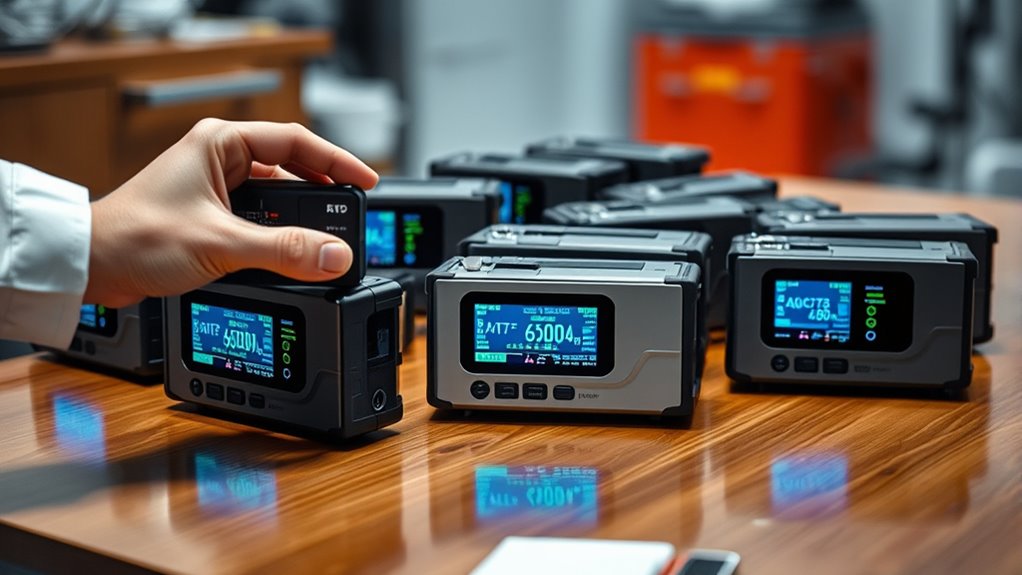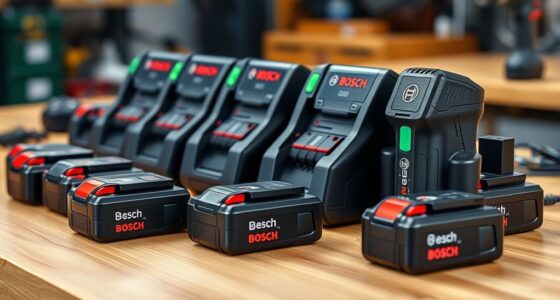If you’re looking for the best battery conductance testers of 2025, I recommend options like the TOPDON BT100 and BT200, Autel MaxiBAS BT506 and BT608, and the Midtronics PBT-100, as they offer quick, accurate diagnostics for various battery types. These devices come with features like printing, multiple language support, and compatibility with 12V/24V systems. Keep exploring, and you’ll discover which one best fits your needs for reliable battery health checks.
Key Takeaways
- Supports testing of lead-acid batteries (flooded, AGM, GEL, EFB) with high accuracy and rapid results, suitable for professional diagnostics.
- Features comprehensive data displays, including SOH, SOC, voltage, and internal resistance, for precise battery health assessment.
- Includes user-friendly interfaces with LCD screens, built-in printers, and safety protections like polarity reversal and short circuit safeguards.
- Offers connectivity options such as Bluetooth and Wi-Fi for data transfer, logging, and report sharing, enhancing diagnostic efficiency.
- Built with durable materials, reliable performance, and firmware updates, ensuring long-term accuracy and value in battery testing.
TOPDON BT100 Car Battery Tester (12V Load & CCA Analyzer)

If you’re looking for a reliable and versatile battery tester that’s perfect for both DIY enthusiasts and auto professionals, the TOPDON BT100 is an excellent choice. This 12V load tester supports various lead-acid batteries, including flooded, AGM, GEL, and EFB types, with capacities from 100-2000 CCA. It provides detailed data like SOH, SOC, voltage, and current, helping you accurately assess battery health. Designed for safety, it requires proper attachment before powering on and works without prior charging. Its user-friendly interface, quick diagnostic results, and compatibility with different vehicle types make it a practical tool for everyday use or professional diagnostics.
Best For: DIY car owners and auto professionals seeking a reliable, versatile battery tester for various lead-acid batteries and vehicle types.
Pros:
- Supports multiple lead-acid battery types including flooded, AGM, GEL, and EFB for wide compatibility.
- Provides comprehensive diagnostic data such as SOH, SOC, voltage, and current for accurate battery assessment.
- Compact, lightweight, and easy to use with a user-friendly interface, ideal for both amateurs and professionals.
Cons:
- Limited to 12V lead-acid batteries; not suitable for lithium-ion or other battery chemistries.
- Requires proper attachment before powering on for safe operation, which may be challenging for some users.
- Does not include additional features like Bluetooth connectivity or data logging beyond basic testing functions.
TOPDON BT200 Car Battery and Alternator Tester
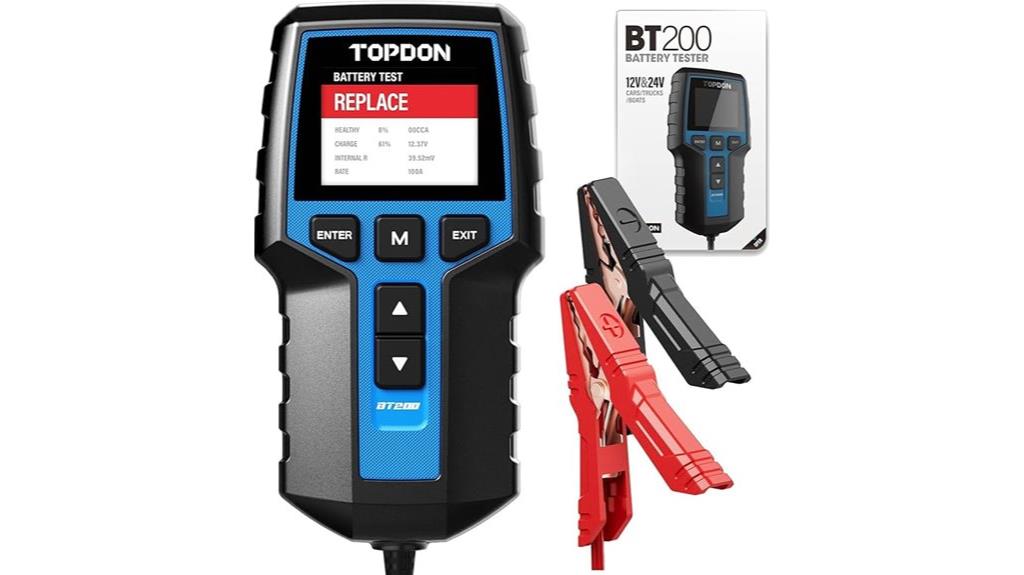
The TOPDON BT200 Car Battery and Alternator Tester stands out as an excellent choice for both professional mechanics and DIY enthusiasts who need quick, accurate diagnostics. It supports 12V and 24V batteries, handling 100-2000 CCA, and works with various types like flooded, AGM, GEL, and deep cycle batteries. The device performs thorough tests—battery health, cranking, and charging system status—helping identify issues early. Its advanced conductance technology delivers results within seconds, and the 2.4-inch color LCD makes readings easy to interpret, even in sunlight. Compact and user-friendly, the BT200 is a versatile tool for maintaining vehicle reliability.
Best For: DIY enthusiasts, professional auto mechanics, and vehicle owners seeking quick, accurate battery and alternator diagnostics for a variety of 12V and 24V vehicles.
Pros:
- Supports a wide range of battery types and sizes, including flooded, AGM, GEL, and deep cycle batteries.
- Provides fast and precise testing results using advanced conductance technology within seconds.
- Features a clear 2.4-inch color LCD display that is easy to read even in direct sunlight.
Cons:
- May require some familiarity with vehicle electrical systems for optimal use.
- Limited to testing 12V and 24V batteries; not suitable for higher voltage systems.
- The device’s advanced features could be overwhelming for complete beginners without prior guidance.
ANCEL BA101 Car Battery Tester, 12V Automotive Battery Diagnostic Tool
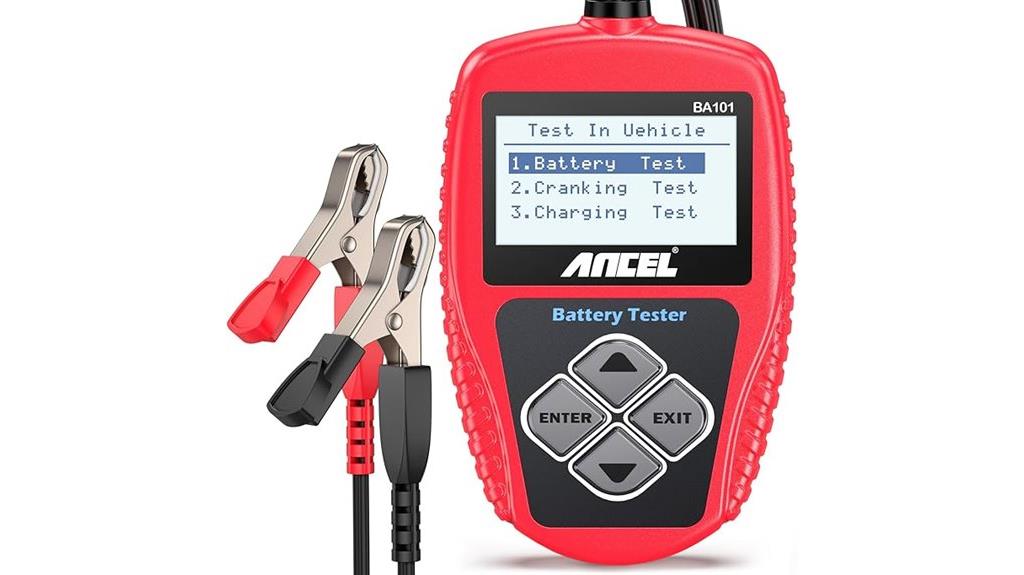
The ANCEL BA101 Car Battery Tester is an excellent choice for vehicle owners and professionals seeking quick, accurate diagnostics of 12V automotive batteries. It supports various battery types, including Flooded, AGM, GEL, and EFB, making it versatile for cars, trucks, boats, and RVs. With its advanced crocodile clips and intelligent chip, it provides 99.6% accurate results for battery health, voltage, and charge status, along with cranking and charging system tests. Its user-friendly design features a clear LCD display, multiple language support, and built-in safety safeguards. Compact and durable, the BA101 delivers reliable diagnostics directly from the vehicle or outside, ensuring peace of mind.
Best For: vehicle owners and professionals who need quick, accurate diagnostics of 12V batteries across a variety of vehicle types and battery formats.
Pros:
- Supports multiple battery types including Flooded, AGM, GEL, and EFB for versatile use
- Provides highly accurate (99.6%) diagnostic results rapidly with advanced crocodile clips and an intelligent chip
- Compact, durable design with an easy-to-read LCD display and safety features for user protection
Cons:
- Does not support lithium, 6V/8V/24V batteries, limiting its compatibility for some applications
- Requires correct input of AH or CCA values for precise results, which may be inconvenient for some users
- Limited to 12V batteries, so not suitable for higher voltage or specialized vehicle batteries
Midtronics 12V Automotive Battery Diagnostic Tool (PBT-100)
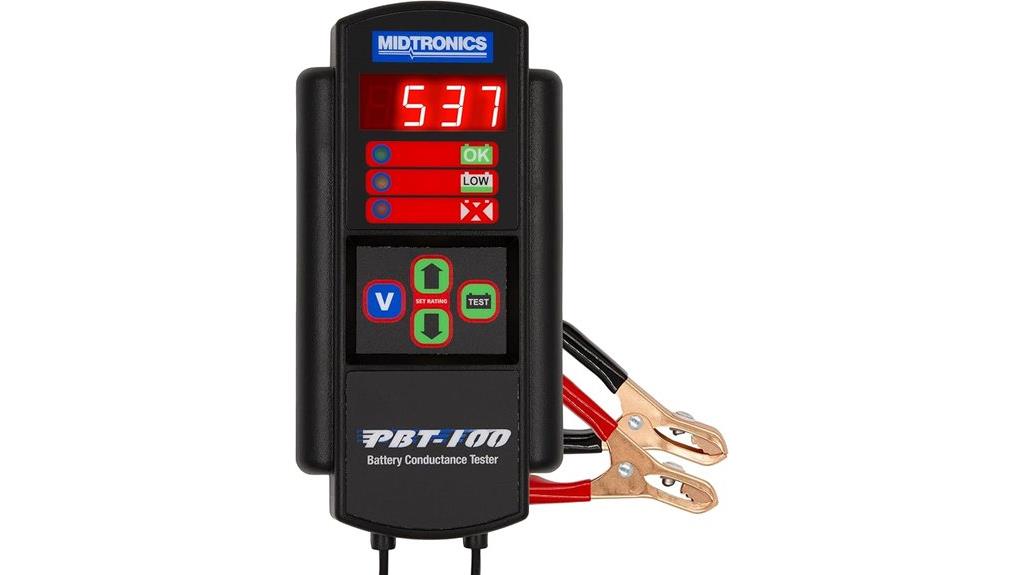
For automotive technicians and serious DIY enthusiasts who want quick, reliable battery diagnostics, the Midtronics 12V Automotive Battery Diagnostic Tool (PBT-100) stands out as an excellent choice. It performs conductance testing within a range of 200-850 CCA, providing accurate results in seconds without user interpretation. The device also features a voltmeter mode for testing starter and charging systems, making it versatile for thorough diagnostics. Compact and lightweight at just 8.3 ounces, it’s easy to handle and store. With OEM compliance and a high customer rating of 4.7 stars, the PBT-100 delivers dependable performance for preventative maintenance and repairs.
Best For: automotive technicians and serious DIY enthusiasts seeking quick, reliable, and comprehensive battery diagnostics.
Pros:
- Performs conductance testing with accurate results in seconds, requiring no user interpretation
- Versatile with voltmeter mode for testing starter and charging systems
- Compact, lightweight, and easy to handle, making it convenient for both professional and personal use
Cons:
- Limited to 12V automotive batteries, not suitable for other battery types
- Requires minimum 10-volt operating voltage, which may limit use in very low battery conditions
- No built-in printer or data storage for record-keeping of test results
Car Battery Tester 12V/24V 100-2000CCA with Printer
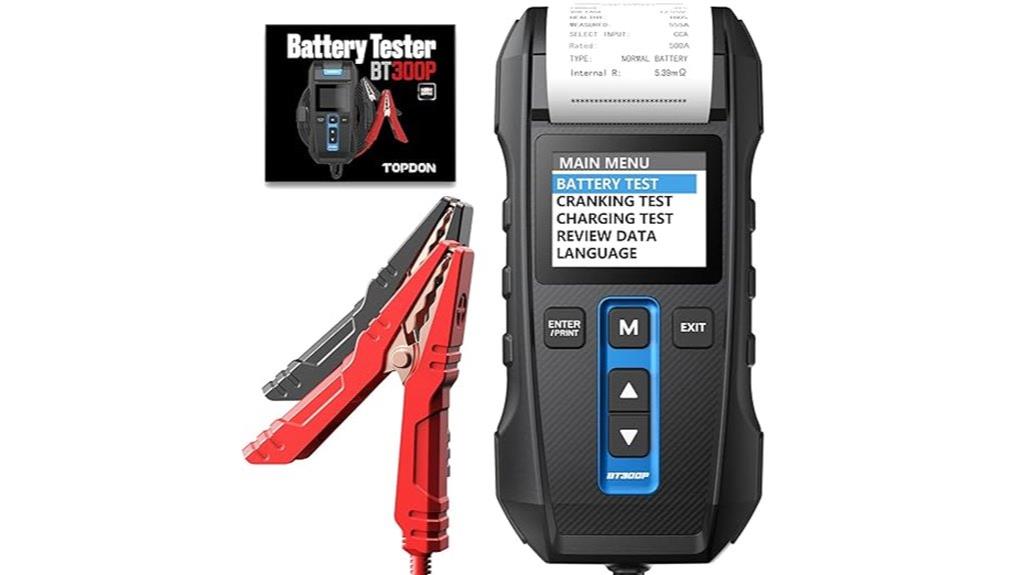
If you need a reliable car battery tester that combines accuracy with convenience, the Car Battery Tester 12V/24V 100-2000CCA with Printer is an excellent choice. It supports a wide range of batteries, including flooded, AGM, Gel, and EFB types, suitable for cars, boats, motorcycles, and more. The device quickly delivers precise results in just three seconds, with 99.5% accuracy, evaluating capacity, health, and charging status. Its 2.4-inch color screen and intuitive interface make testing straightforward, while the built-in thermal printer allows you to save and print diagnostic reports. Overall, it’s a versatile, safe, and user-friendly tool for both professionals and enthusiasts.
Best For: both automotive professionals and enthusiasts who need a quick, accurate, and versatile battery testing solution with record-keeping capabilities.
Pros:
- Fast and highly accurate testing results in just three seconds with 99.5% precision.
- Supports a wide range of battery types and vehicle applications, including cars, boats, motorcycles, and more.
- Built-in thermal printer and color display facilitate easy record-keeping and clear readings in various lighting conditions.
Cons:
- Cable length, while generally sufficient, could be longer for more flexible testing scenarios.
- Occasional paper jams and wear issues may occur with the printer and cables over time.
- Proper operation requires careful selection of battery type and good terminal connections for accurate results.
FOXWELL BT705 Car Battery Tester (12V/24V, 100-2000CCA)
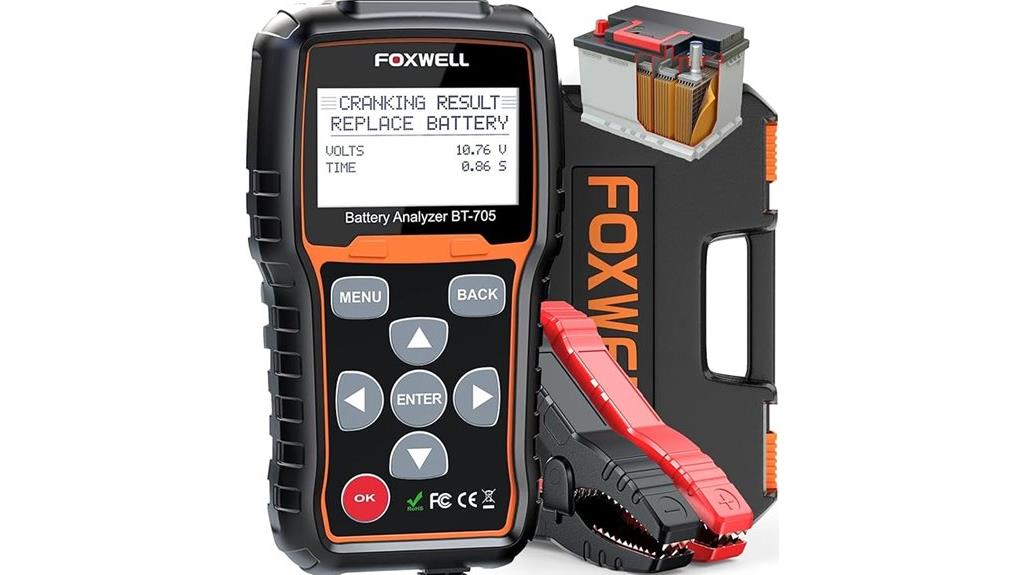
Designed for both professionals and DIY enthusiasts, the FOXWELL BT705 offers advanced conductance technology that delivers 99.9% accurate battery analysis across 12V and 24V systems. It’s compatible with various battery types, including flooded, AGM, spiral, and GEL, with capacities from 100 to 2000 CCA. The device provides detailed insights like State of Health, State of Charge, cranking voltage, and alternator output. Its large 2.8-inch LCD ensures clear readings, while the 5.9-foot cable allows easy solo operation. No app needed—just plug in, test, and read results, making diagnostics simple and reliable.
Best For: automotive professionals and DIY car owners seeking a reliable, easy-to-use battery testing device for various vehicle types and battery configurations.
Pros:
- Provides 99.9% accurate battery and alternator testing results with advanced conductance technology.
- Compatible with multiple battery types (flooded, AGM, spiral, GEL) and suitable for 12V and 24V systems.
- Large 2.8-inch LCD display and 5.9-foot cable enable clear readings and easy solo operation.
Cons:
- Requires proper contact and setup; poor connections can affect test accuracy.
- No smartphone app or digital interface beyond the LCD display, limiting data sharing options.
- Testing procedures may need familiarity with vehicle systems to ensure correct interpretation of results.
KONNWEI KW208 12V Car Battery Tester
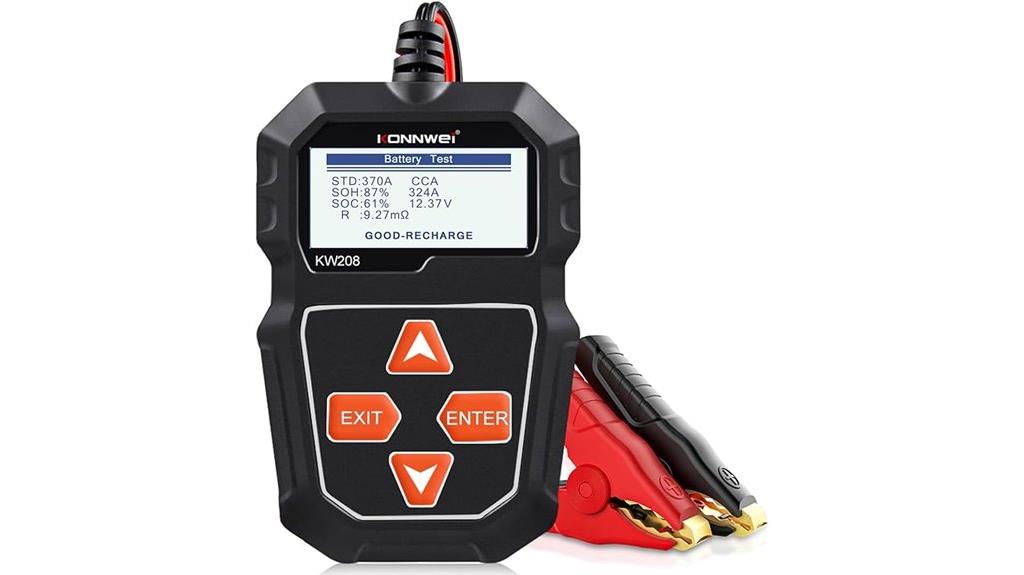
Looking for an affordable yet reliable battery tester that delivers professional-grade results? The KONNWEI KW208 12V Car Battery Tester is a versatile, cost-effective tool perfect for automotive, marine, motorcycle, and boat batteries. It tests all 12V batteries (100-2000 CCA), including flooded, AGM, gel, and spiral types. With a smart AI chip, it provides over 99.7% accurate results quickly, analyzing voltage, internal resistance, CCA, and charge capacity. Compact and powered directly from your vehicle, it’s easy to use and store. Its ability to diagnose battery health, starters, and alternators makes it a must-have for routine maintenance and troubleshooting.
Best For: vehicle owners and maintenance enthusiasts seeking a reliable, affordable tool for quick and accurate 12V battery testing and diagnostics.
Pros:
- Provides professional-grade results with over 99.7% accuracy thanks to smart AI technology.
- Versatile, compatible with all 12V battery types including flooded, AGM, gel, and spiral.
- Compact, portable, and powered directly from the vehicle, making it easy to use and store.
Cons:
- Manual may be small and somewhat skimpy, potentially challenging for some users.
- Requires correct input of battery type and CCA for optimal accuracy.
- Less reliable at very low temperatures, which may affect test results.
FOXWELL BT705 Plus Car Battery Tester (12V/24V, 100-2000CCA)
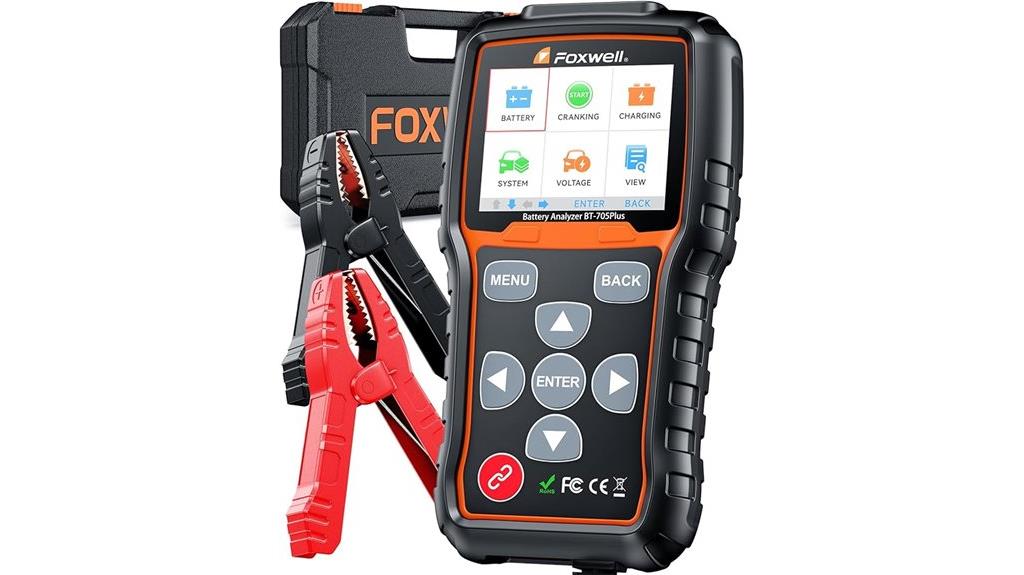
The FOXWELL BT705 Plus Car Battery Tester stands out as an excellent choice for both DIY enthusiasts and professionals who need quick, accurate diagnostics across a wide range of vehicle types. Its upgraded design features a faster chip and smarter algorithms, reducing testing time by 30%. Compatible with 12V and 24V systems, it tests flooded, AGM, spiral, and GEL lead-acid batteries up to 2000 CCA. It provides detailed assessments of battery health, charge, starting, and charging systems. The 2.8-inch LCD display makes results easy to interpret, while its compact, lightweight build ensures straightforward operation in any setting.
Best For: DIY enthusiasts and automotive professionals seeking a quick, accurate, and versatile battery testing solution for various vehicle types and battery systems.
Pros:
- Fast testing with 30% reduced time thanks to upgraded chip and smarter algorithms.
- Compatible with a wide range of batteries and vehicle types, including RVs, boats, motorcycles, and heavy-duty trucks.
- Clear, high-contrast 2.8-inch LCD display for easy interpretation of results in any lighting condition.
Cons:
- Some users report the screen not lighting up after multiple tests.
- Potential safety concerns with sparks when attaching clamps.
- Build quality and internal components may be questioned due to light weight and durability issues.
Autel MaxiBAS BT506 Car Battery Tester
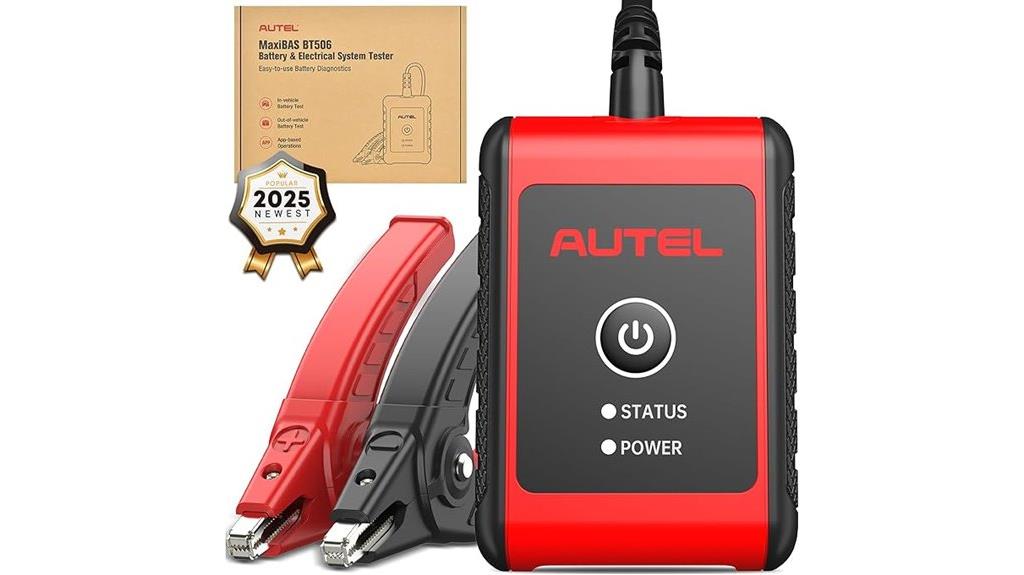
If you’re a professional technician or a serious car enthusiast, the Autel MaxiBAS BT506 Car Battery Tester stands out as a top choice for accurate and thorough battery diagnostics. It tests 6V and 12V batteries with 100-2000 CCA, compatible with flooded, AGM, spiral, EFB, and GEL types. Supporting 12V/24V systems, it offers detailed analysis of voltage, internal resistance, capacity, and health. Its adaptive conductance technology guarantees precise results quickly, helping identify weak batteries, alternator issues, or starter problems. Compact, lightweight, and easy to connect via Bluetooth to smartphones or Autel scanners, it’s perfect for both professional shops and DIY users seeking reliable diagnostics.
Best For: professional automotive technicians and serious car enthusiasts seeking reliable, comprehensive battery diagnostics for various vehicle types.
Pros:
- Provides accurate testing of 6V/12V batteries with a wide CCA range (100-2000), suitable for diverse battery types.
- Supports Bluetooth connectivity with smartphones and Autel scanners for easy data management and advanced diagnostics.
- Compact and lightweight design makes it portable and convenient for both shop and DIY use.
Cons:
- Not compatible with wired scanners or k*-y programming tools, limiting integration options.
- Requires a compatible USB charging cable (not included) for power, which may inconvenience some users.
- The need for app registration and QR code scanning may add initial setup time for new users.
Autel MaxiBAS BT608 Car Battery Tester
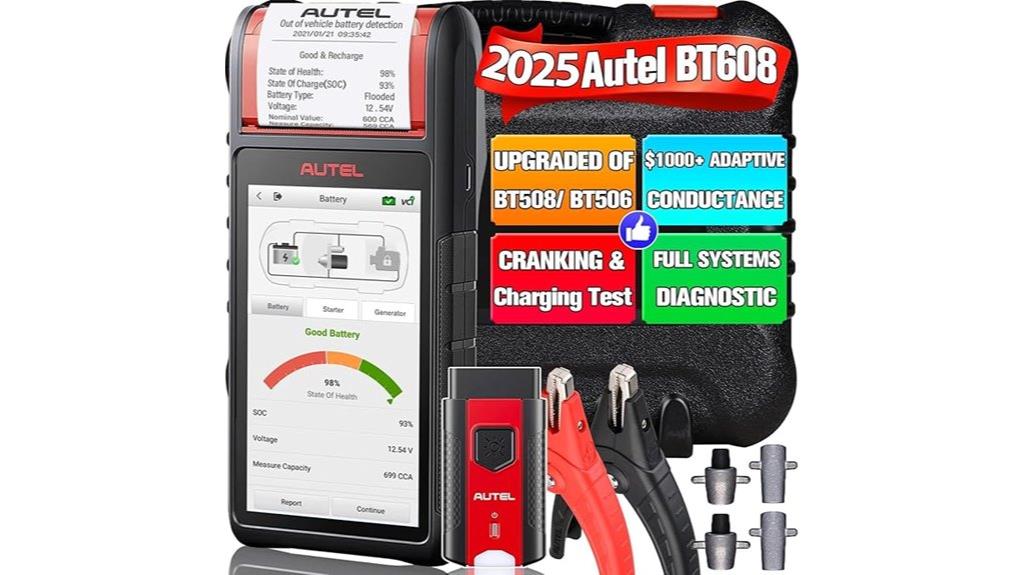
Are you searching for a reliable battery tester that combines advanced diagnostics with ease of use? The Autel MaxiBAS BT608 (E) is a top choice for 2025. It supports 6V/12V batteries from 100 to 3000 CCA, including Flooded, AGM, Spiral, EFB, and GEL types. Its adaptive conductance technology guarantees over 95% diagnostic accuracy, even for low-capacity batteries. It performs thorough cranking, charging, and system diagnostics for 12V and 24V systems, plus battery registration and electrical system resets. With lifetime free updates and built-in Wi-Fi printing, it’s a versatile tool perfect for shops or DIYers wanting fast, precise, and detailed battery and system analysis.
Best For: automotive repair shops and DIY enthusiasts seeking a highly accurate, versatile battery tester with advanced diagnostics and system reset capabilities.
Pros:
- Supports a wide range of battery types and sizes with high diagnostic accuracy (>95%) thanks to adaptive conductance technology.
- Offers comprehensive cranking, charging, and system diagnostics for 12V and 24V systems, including ECU data and fault code reading.
- Includes battery registration, electrical system reset, Wi-Fi printing, and lifetime free software updates for ongoing support.
Cons:
- The device’s advanced features and multiple functions may require some training for optimal use.
- Its size and portability might be less suitable for very tight or hard-to-access engine bays.
- The initial investment may be higher compared to basic battery testers, which might be a consideration for casual users.
FOXWELL BT780 Car Battery Tester with Printer
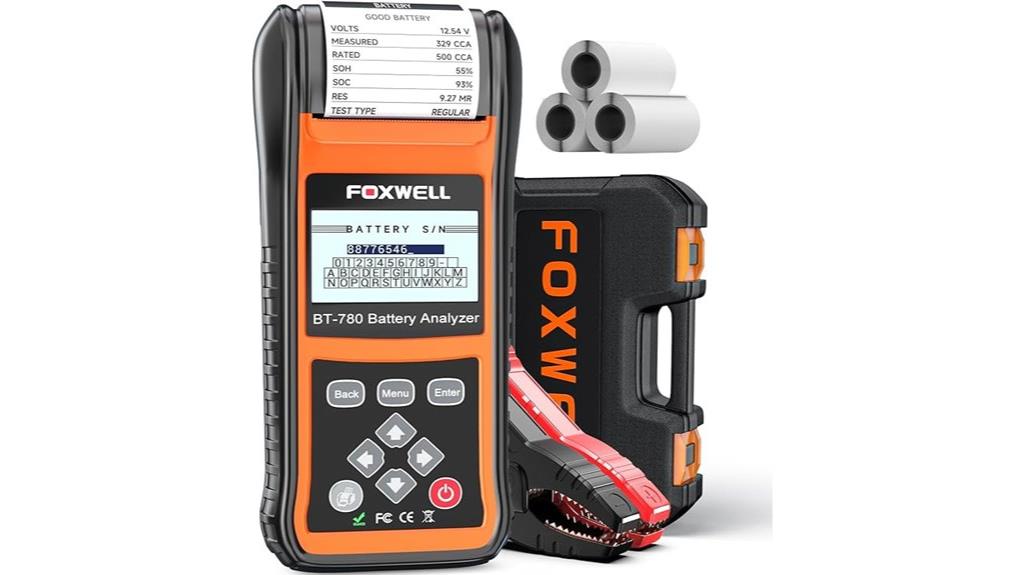
For professionals seeking a reliable, all-in-one battery testing solution, the FOXWELL BT780 Car Battery Tester with Printer stands out thanks to its advanced diagnostics and thorough compatibility. It offers true pro-level tests, including 6V SOH/SOC, and 12V/24V cranking and charging analysis. Compatible with various batteries—Flooded, AGM, Gel, and Start-Stop—covering vehicles from cars to heavy machinery, it guarantees precise results across different applications. Its self-powered design works even with deeply discharged batteries, and the built-in printer delivers quick, professional reports. With a rugged build, user-friendly features, and firmware updates, the BT780 is a versatile, dependable diagnostic tool for any professional setting.
Best For: professional automotive technicians and fleet managers seeking a comprehensive, accurate, and versatile battery testing solution with printing capabilities.
Pros:
- Supports a wide range of battery types and vehicles, ensuring versatile diagnostic coverage
- Self-powered design allows testing without external power, even on deeply discharged batteries
- Built-in printer and support for multiple user accounts streamline report generation and data management
Cons:
- The device may be relatively expensive compared to basic battery testers
- Firmware updates require a TF card, which could be less convenient than online updates
- Its advanced features might be more complex for casual or less experienced users
Factors to Consider When Choosing a Battery Conductance Tester
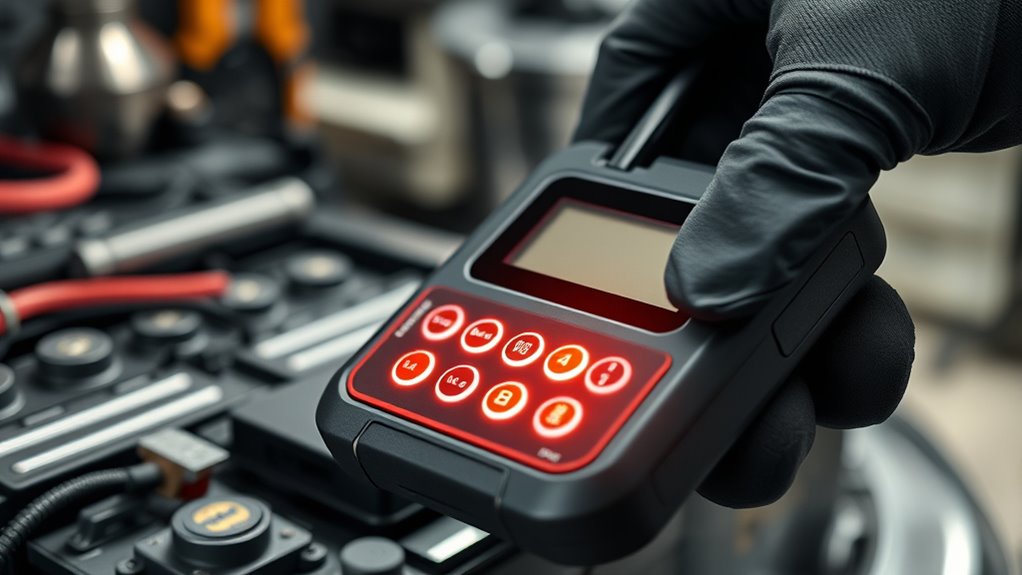
When selecting a battery conductance tester, I consider key factors like compatibility with different battery types and the accuracy of testing results. Ease of use, durability, and safety features also play vital roles in my choice. Understanding these points helps guarantee I pick a reliable tool that meets my specific needs.
Battery Compatibility Needs
Choosing the right battery conductance tester requires careful attention to compatibility factors to guarantee accurate results. First, make sure the tester supports your battery’s voltage, whether it’s 12V or 24V, to match your vehicle or equipment. Confirm it’s compatible with your battery type, such as flooded, AGM, GEL, or EFB, for precise diagnostics. Check the Cold Cranking Amps (CCA) range supported; it should cover your battery’s capacity, like 100 to 2000 CCA. If you need an in-depth assessment, verify whether the device can test other components like alternators or charging systems. Lastly, ensure the tester can handle your specific battery sizes and capacities. Proper compatibility prevents inaccuracies and ensures your testing process is both reliable and efficient.
Testing Accuracy Levels
Selecting a battery conductance tester with high accuracy is vital for getting reliable health assessments. Look for models with measurement tolerances of ±1-3%, as these provide precise insights into battery condition. The device’s calibration standards, aligned with OEM or IEC guidelines, indicate its reliability. Environmental factors like temperature can impact readings, so choose testers that automatically compensate for such variables. The resolution of the ADC and the quality of internal circuitry directly influence measurement precision, so opt for high-quality components. Proper setup and guaranteeing consistent contact between clamps and terminals are essential for accurate results. Ultimately, a tester with proven accuracy standards helps prevent misdiagnoses and guarantees you make informed maintenance decisions, saving time and preventing unnecessary replacements.
Ease of Use
A battery conductance tester that’s easy to use can considerably streamline the diagnostic process and minimize user errors. Look for models with a straightforward interface—clear buttons and simple menus make operation intuitive. A large, backlit display allows for quick reading of results in various lighting conditions, saving time and reducing mistakes. Automated testing procedures that require minimal input boost efficiency and help new users get up to speed faster. Clear indicators like LED lights or color-coded results make interpretation simple, even without technical expertise. Additionally, a compact, ergonomic design enhances comfort during frequent or on-the-go testing. Overall, devices that prioritize ease of use make battery diagnostics more accessible, accurate, and less stressful, especially for those unfamiliar with complex equipment.
Durability and Build
When evaluating a battery conductance tester, durability and build quality are crucial factors that guarantee reliable performance over time. A sturdy casing made from reinforced ABS or metal ensures the device can handle drops, shocks, and tough working conditions without damage. High-quality, corrosion-resistant clamps and connectors maintain consistent contact and prevent failure during testing. A sealed or weatherproof design allows the tester to perform effectively outdoors, even in rain, dust, or extreme temperatures. Internal components like circuitry and sensors should be crafted from high-grade materials to resist wear, electrical interference, and corrosion. Additionally, an ergonomic handle and solid user interface reduce physical strain and protect the device from accidental damage during frequent use. Overall, robust construction extends the lifespan and reliability of the tester.
Safety Features
Safety features are key considerations that guarantee both user protection and accurate testing results. I always look for conductance testers with polarity reversal protection to prevent damage or incorrect readings if I accidentally connect the clamps backward. Spark-proof features are also essential, especially in hazardous environments, as they reduce the risk of electrical sparks during testing. Short circuit protection safeguards both the device and the vehicle’s electrical system, giving me peace of mind. Overcurrent protection is vital to prevent excessive current flow that could cause injuries or damage. Additionally, insulated and durable clamps are a must—they minimize the risk of shocks and ensure a secure connection throughout testing. Prioritizing these safety features makes the testing process safer and more reliable.
Data Storage Options
Choosing the right data storage options guarantees I can track battery performance accurately over time. Internal memory lets me save multiple test results, making trend analysis straightforward. Some models support external storage like USB drives or SD cards, ideal for long-term record keeping. Data logging features automatically save each measurement, reducing manual input errors. Portable devices with Bluetooth or Wi-Fi can sync data to smartphones or cloud platforms, providing quick access and easy sharing. The storage capacity varies widely—advanced models can hold hundreds of results, while basic units store only a few. When selecting a tester, I consider how much data I’ll need to retain and how I want to access it. Reliable and flexible storage options ensure I can monitor battery health effectively over time.
Portability and Size
A compact and lightweight design is essential for a battery conductance tester, especially if I need to carry it around frequently. A smaller size makes it easy to transport and store, fitting comfortably in vehicle glove compartments or toolkits. This portability is particularly helpful for field use, allowing quick battery checks without relying on external power sources. Portable testers often have integrated batteries or rechargeable options, reducing dependence on outlets and making on-the-spot diagnostics more convenient. Additionally, a smaller device is easier to handle when connecting clamps to tight or awkward battery terminals. Overall, a compact and lightweight tester minimizes setup time and simplifies routine inspections, roadside diagnostics, and on-the-go maintenance, ensuring I can perform accurate tests anytime, anywhere.
Price and Value
When evaluating the price and value of a battery conductance tester, I focus on how well the device’s features, build quality, and support justify its cost. Higher-priced models often provide advanced diagnostics, improved accuracy, and better durability, which translate into long-term savings and reliability. Cheaper options may lack essential features or compatibility, possibly leading to additional expenses for upgrades or replacements. I look for a good balance between price and capabilities, ensuring I get reliable readings without paying for unnecessary functions. However, budget-friendly models sometimes compromise build quality or measurement precision, which can affect diagnostic accuracy. Ultimately, I compare features, durability, and support relative to price to find a device that offers the best return on investment and consistent performance.
Frequently Asked Questions
How Do Battery Conductance Testers Compare to Traditional Voltage Testers?
Battery conductance testers are more accurate than traditional voltage testers because they assess the battery’s overall health, not just its voltage. I find conductance testers provide quick, reliable diagnostics by measuring internal resistance, which indicates capacity and potential failure. Voltage testers only show surface-level voltage, which can be misleading. So, for a true picture of a battery’s condition, I prefer conductance testers—they’re more precise and save me time.
Can Conductance Testers Diagnose Hidden or Internal Battery Faults?
Absolutely, conductance testers can spot those sneaky internal faults that hide behind the battery’s smile. It’s almost like a medical scan for your car’s heart—detecting issues that voltage tests miss, whispering secrets of internal corrosion or weakened plates. I’ve seen these testers uncover hidden problems that would otherwise stay hidden, saving me from potential roadside surprises. So yes, they’re your secret weapon against unseen battery villains.
Are There Specific Maintenance Routines for Prolonging Tester Accuracy?
Yes, I follow specific maintenance routines to prolong my tester’s accuracy. I regularly clean the contacts with a soft brush or cloth to prevent corrosion, and I keep the device stored in a cool, dry place to avoid damage from moisture or extreme temperatures. Additionally, I calibrate it periodically using manufacturer-recommended procedures and replace worn-out parts promptly to guarantee consistent, reliable test results.
How Often Should a Professional Test Vehicle Batteries With Conductance Testers?
I recommend testing vehicle batteries with conductance testers at least every six months, especially if the vehicle is used frequently or in harsh conditions. Regular testing helps catch potential issues early, preventing breakdowns and extending battery life. If your vehicle shows signs of battery problems or if you’re in a demanding environment, I suggest testing more often—perhaps quarterly—to guarantee reliable performance and avoid unexpected failures.
What Safety Precautions Are Necessary When Using Conductance Testing Devices?
When using conductance testers, I always wear safety glasses and gloves—think of it like armor protecting you. I’ve seen sparks fly during testing, so making sure the vehicle is off and the battery disconnected is vital. Keep the tester in good condition, avoid touching metal parts, and work in a dry environment. These precautions keep you safe and guarantee accurate results, just like a shield in battle.
Conclusion
Choosing the right battery conductance tester is like finding a trusted lighthouse in a storm—guiding you safely through the dark unknown of car diagnostics. With the top options I’ve highlighted, you’ll have the clarity and confidence to keep your vehicle humming smoothly. Don’t let a failing battery catch you off guard; instead, arm yourself with the right tool and stay ahead of the game. Your car’s health is the journey, and these testers are your guiding star.

